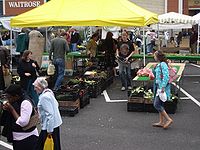
Photo from wikipedia
Youth health, long-term food sovereignty and the reclamation of traditional food-related knowledge are areas of concern within Indigenous communities in Canada. Learning Circles: Local Healthy Food to School (LC:LHF2S) built… Click to show full abstract
Youth health, long-term food sovereignty and the reclamation of traditional food-related knowledge are areas of concern within Indigenous communities in Canada. Learning Circles: Local Healthy Food to School (LC:LHF2S) built on an exemplar program in four predominantly Indigenous communities. In each, the initiative worked with interested community members to plan, implement and evaluate a range of activities aimed at enhancing access to local, healthy and traditional foods for schools and youth. This case study describes the context, process, outcomes and perceptions of implementation in one of the communities, Hazelton/Upper Skeena, located in northern British Columbia. Data were collected between 2016–2019 and included semi-directed interviews with community members and LCEF (n = 18), process reporting (e.g., LCEF reports, emails, conference calls and tracking data), photographs and video footage, and photovoice. Data were analyzed thematically. Hazelton/Upper Skeena has an active local and traditional food culture. Indigenous governance was supportive, and community members focused on partnership and leadership development, gardens, and food skills work. Findings point to strengths; traditional food, knowledge and practices are valued by youth and were prioritized. LC:LHF2S is a flexible initiative that aims to engage the broader community, and exemplifies some of the best practices recommended for community-based initiatives within Indigenous communities. Results indicate that a LC is a feasible venture in this community; one that can facilitate partnership-building and contribute to increased access to local and traditional food among school-aged youth. Recommendations based on community input may help the uptake of the model in similar communities across Canada, and globally.
Journal Title: International Journal of Environmental Research and Public Health
Year Published: 2022
Link to full text (if available)
Share on Social Media: Sign Up to like & get
recommendations!